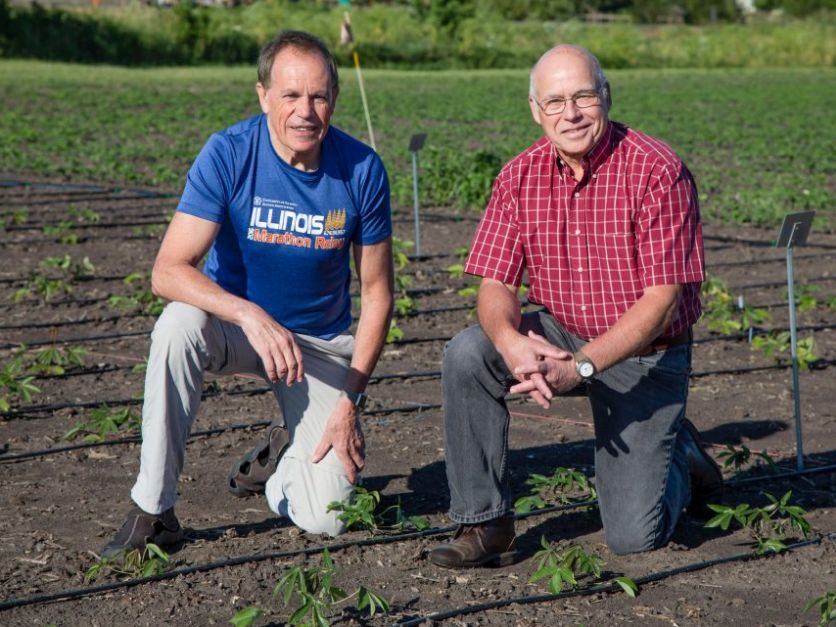WASHINGTON, Sept. 15, 2017 – The Foundation for Food and Agriculture Research (FFAR) today announced a $15 million contribution – its biggest grant to date – to a five-year, $45-million research project at the University of Illinois that is already promising to boost crop yields 20 percent by improving photosynthetic efficiency.
The project is being co-funded by the Bill & Melinda Gates Foundation ($25 million) and the U.K. Department for International Development ($5 million). The grant was announced today on the Illinois campus in Champaign.
According to FFAR, which was established in the 2014 farm bill, the project, Realizing Increased Photosynthetic Efficiency, or RIPE, will harness a plant's photosynthesis process to increase output, or yield, in food crops including soybeans, cassava and cowpeas. The funding is aimed at breaking through the “stagnant yield ceilings” for several staple food crops and easing food insecurity around the world.
"The RIPE project has proven that photosynthesis can be redesigned to increase crop yields by at least 20 percent without additional resources," said FFAR Executive Director Sally Rockey. "FFAR is proud to support this innovative leap toward reducing global hunger, an issue that often seems intractable in the face of a growing population, changing climate, and limited natural resources."
Indeed, the project was announced on the same day that the United Nations released an annual report showing global hunger on the rise again – driven by conflict – after steadily declining for over a decade. The report found that hunger affected 815 million people in 2016 (11 percent of the world population), an increase of 38 million people over 2015.
In its announcement, FFAR noted that 50 years of photosynthesis research, with several landmark discoveries at University of Illinois, has enabled RIPE to simulate the 170-step process of photosynthesis from the inner workings of enzymes to interactions between neighboring plants in the field. RIPE used these models to identify seven potential pipelines to improve photosynthesis, and with the support of an initial $25 million, five-year grant from the Gates Foundation, researchers began work in 2012 to try to turn their ideas into sustainable yield increases. Today's announcement ensures that this work will continue, FFAR said.
RIPE Director Stephen Long, Gutgsell Endowed Professor of Crop Sciences and Plant Biology at the University of Illinois (pictured above on the left, with fellow researcher Don Ort), said that the report released today by the five U.N. agencies “reinforces our mission to work doggedly to provide new means to eradicate world hunger and malnutrition by 2030 and beyond.
"This investment is timely,” he said, noting that annual yield gains in several crops are stagnating. “The means to achieve substantial improvement must be developed now if we are to provide sufficient food by 2030 and beyond for a growing and increasingly urban world population when food production must also adapt sustainably to a changing climate."
Last year, RIPE published work in Science that described how its research could boost crop productivity by 20 percent, compared to typical annual yield gains of just 1 percent or less. Two other RIPE pipelines have now shown even greater yield improvements in greenhouse and preliminary field trials, the researcher says.
"Our modeling predicts that several of these improvements can be combined to achieve additive yield increases, providing real hope that a 50 percent yield increase in just three decades is possible," Long said. "With the reinvestment, a central priority will be to move these improved photosynthesis traits into commodity crops of the developed world, like soybeans, as well as crops that matter in the developing world, including cassava and cowpeas."
Researchers anticipate commercial seeds benefiting from RIPE research will be available to farmers within approximately 15 years. FFAR says RIPE and its funders will ensure their high-yielding food crops are globally available, particularly in Sub-Saharan Africa and Southeast Asia, and affordable for smallholder farmers to help feed the world's hungriest and reduce poverty. According to FFAR, agriculture has been shown to reduce poverty four times more effectively than growth in other sectors.
(Photo: Brian Stauffer/University of Illinois)


